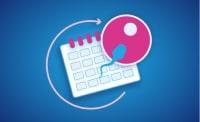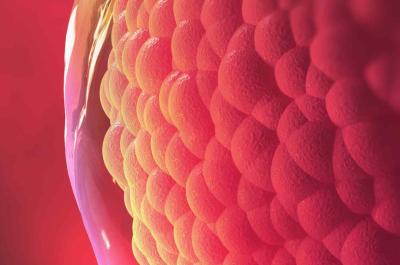
We all know what period pain feels like, but what about ovulation pain? If you’ve ever felt that little bit of cramping in your abdomen around the middle of your cycle, you might be experiencing ovulation pain, also known as mittelschmerz (which is German for ‘middle pain’). Not everyone experiences ovulation pain and it can be difficult to establish that it is actually related to ovulation. You may have pain for a number of other reasons. It’s important that if you are suffering from any form of pain or are worried, that you see your doctor.
Here we find out more about ovulation pain.
1. What does ovulation pain feel like?
Ovulation pain is usually felt on either the left or the right side of the lower abdomen, depending on which ovary is releasing an egg. It can be dull and cramp like, or it may be a sharp and sudden localised pain.
Generally, ovulation pain doesn’t last very long, usually a few minutes to a few hours, but it is possible for it to last longer. If, however, the pain is severe or persists, or you are worried that it might not be associated with ovulation you should consult your doctor.
2. What causes ovulation pain?
The actual cause of the pain is unknown, but it may be associated with the egg breaking through the ovary wall. When this happens a small amount of fluid or blood may be released which can irritate nearby nerves.
3. How common is ovulation pain?
Many women won’t feel any discomfort at all, but some get pain every cycle, others only occasionally. You may feel a little pain during one cycle and no pain at all the next.
4. When should you see a doctor?
If the pain is severe or won't go away, or you are concerned about any form of pain, you should see your doctor and get it checked out right away.
5. Can tracking ovulation pain help detect my fertile days?
Tracking ovulation pain is not an accurate method to identify your fertile days. Whilst it takes place around the time you ovulate, not all women will experience pain, and not in every cycle. It’s also important that you don’t ignore abdominal pain as it may not be associated with ovulation but an underlying medical condition.
If you are interested in identifying your fertile days there are other methods which are more accurate, such as using an ovulation test. If you are trying to get pregnant you may want to learn more about ovulation and your fertility, and how to get pregnant faster.

Advanced Digital Ovulation Test
In every cycle there are only a few days when a woman can conceive, so having sex on these days is very important if you are trying to get pregnant. The Clearblue® Advanced Digital Ovulation Test is the first and ONLY test that typically identifies 4 or more fertile days each cycle.

Ovulation calculator
Knowing your most fertile days can increase your chance of getting pregnant and knowing the likelihood you may ovulate on a specific day may help you better understand your fertile window.




